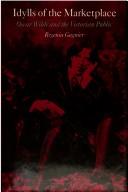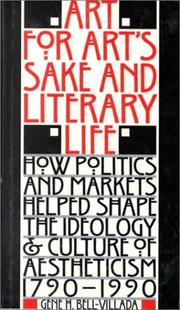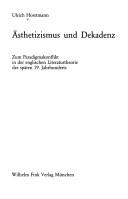| Listing 1 - 10 of 78 | << page >> |
Sort by
|
Book
ISBN: 2910394050 9782910394059 Year: 1996 Publisher: Poitiers : Université de Poitiers:
Abstract | Keywords | Export | Availability | Bookmark
 Loading...
Loading...Choose an application
- Reference Manager
- EndNote
- RefWorks (Direct export to RefWorks)
Book
ISBN: 9783846766125 9783770566129 Year: 2021 Publisher: Paderborn : Brill | Fink
Abstract | Keywords | Export | Availability | Bookmark
 Loading...
Loading...Choose an application
- Reference Manager
- EndNote
- RefWorks (Direct export to RefWorks)
Zensur, männliche, familiäre und sexuelle Gewalt, Krieg und Terrorismus, Shoah, medizinische, theatrale und performative Gewalt - Gewaltformen sind in zahlreichen Bereichen sichtbar. Dabei hat Gewalt selbst keinen festen Ort, vielmehr befindet sie sich in permanenten Umformungsprozessen. Während Gewalt in der Literatur vielfach kulturkritische Implikationen hat, erweist sich die Gewalt der Literatur als selbstreflexiv. Der Sammelband analysiert, wie diskursive Gewaltformen ästhetisch geformt werden, wie die gesellschaftliche Gewalt auf literarische Texte zurückwirkt und wie literarische Texte selbst Einfluss auf gesellschaftliche Gewaltformationen nehmen. Das den vorliegenden Band strukturierende Untersuchungsinstrument - Gewaltformen/Gewalt formen - bietet einen übergreifenden theoretisch-methodischen Ansatz: Die literarische Vertextung von Gewalt wird über die Kategorie der Formung mit der Diskursivität der Literatur verbunden.
Book
ISBN: 9781684174911 9780674032842 Year: 2009 Publisher: Boston : Leiden; Boston : Harvard University Asia Center BRILL
Abstract | Keywords | Export | Availability | Bookmark
 Loading...
Loading...Choose an application
- Reference Manager
- EndNote
- RefWorks (Direct export to RefWorks)
Aestheticism (Literature) --- Kobayashi, Hideo, --- Criticism and interpretation.
Book
ISBN: 9781351555463 9781909662506 9780367601164 9781351555456 9781315090221 Year: 2017 Publisher: Abingdon Routledge
Abstract | Keywords | Export | Availability | Bookmark
 Loading...
Loading...Choose an application
- Reference Manager
- EndNote
- RefWorks (Direct export to RefWorks)
Oscar Wilde is more than a name, more than an author. From precocious Oxford undergraduate to cause celebre of the West End of the 1890s, to infamous criminal, the proper name Wilde has become an event in the history of literature and culture. Taking Wilde seriously as a philosopher in his own right, Whiteley's groundbreaking book places his texts into their philosophical context in order to show how Wilde broke from his peers, and in particular from idealism, and challenges recent neo-historicist readings of Wilde which seem content to limit his irruptive power. Using the paradoxical concept of the simulacrum to resituate Wilde's work in relation to both his precursors and his contemporaries, Whiteley's study reads Wilde through Deleuze and postmodern philosophical commentary on the simulacrum. In a series of striking juxtapositions, Whiteley challenges us to rethink both Oscar Wilde's aesthetics and his philosophy, to take seriously both the man and the mask. His philosophy of masks is revealed to figure a truth of a different kind - the simulacra through which Wilde begins to develop and formulate a mature philosophy that constitutes an ethics of joy.
Aestheticism (Literature) --- Aesthetics --- Wilde, Oscar, --- Philosophy.

ISBN: 0804713340 Year: 1986 Publisher: Stanford (Calif.) : Stanford university press,
Abstract | Keywords | Export | Availability | Bookmark
 Loading...
Loading...Choose an application
- Reference Manager
- EndNote
- RefWorks (Direct export to RefWorks)
Aestheticism (Literature). --- Authors and readers --- Reader-response criticism.
Book
ISBN: 8820429659 Year: 1988 Publisher: Milano : Angeli,
Abstract | Keywords | Export | Availability | Bookmark
 Loading...
Loading...Choose an application
- Reference Manager
- EndNote
- RefWorks (Direct export to RefWorks)
Aestheticism (Literature). --- Futurism (Literary movement). --- Italian literature --- History and criticism.
Book
Year: 1954 Publisher: Helsinki : Suomalaisen kirjallisuuden seura,
Abstract | Keywords | Export | Availability | Bookmark
 Loading...
Loading...Choose an application
- Reference Manager
- EndNote
- RefWorks (Direct export to RefWorks)
English language --- Aestheticism (Literature). --- Style. --- Wilde, Oscar, --- Literary style.
Book
Year: 1967 Publisher: Bloomington : Indiana University Press,
Abstract | Keywords | Export | Availability | Bookmark
 Loading...
Loading...Choose an application
- Reference Manager
- EndNote
- RefWorks (Direct export to RefWorks)
Aesthetics, British --- Aestheticism (Literature) --- Arnold, Matthew, --- Aesthetics. --- Great Britain --- History

ISBN: 0803212607 Year: 1996 Publisher: Lincoln University of Nebraska press
Abstract | Keywords | Export | Availability | Bookmark
 Loading...
Loading...Choose an application
- Reference Manager
- EndNote
- RefWorks (Direct export to RefWorks)

ISBN: 377052098X Year: 1983 Publisher: München Fink
Abstract | Keywords | Export | Availability | Bookmark
 Loading...
Loading...Choose an application
- Reference Manager
- EndNote
- RefWorks (Direct export to RefWorks)
Aestheticism (Literature) --- Decadence (Literary movement) --- English literature --- History and criticism
| Listing 1 - 10 of 78 | << page >> |
Sort by
|

 Search
Search Feedback
Feedback About UniCat
About UniCat  Help
Help News
News